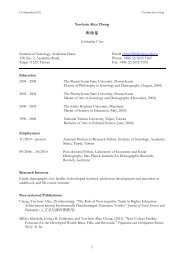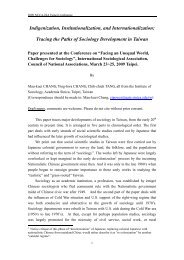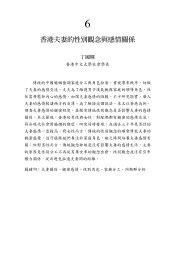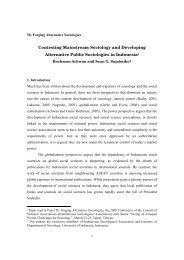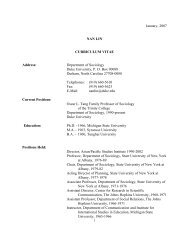powerpoint
powerpoint
powerpoint
You also want an ePaper? Increase the reach of your titles
YUMPU automatically turns print PDFs into web optimized ePapers that Google loves.
1<br />
Confronting Historical Legacies<br />
24th March<br />
Facing an equal world – Challenges for Sociology<br />
Our (scientific) Community and Our Society:<br />
rethinking the role and dilemmas of national<br />
sociological associations - the Portuguese case<br />
Luís Baptista and Paulo Machado<br />
Members of the Portuguese Sociological Association - APS
2<br />
Confronting Historical Legacies<br />
24th March<br />
Main topics to discuss:<br />
1. The social relevancy of contemporary sociological work<br />
2. The role of the Portuguese sociological community<br />
within a society in a profound social change<br />
Further discussion:<br />
3. Portuguese Sociological Association agenda. Does it matter<br />
For what To whom How<br />
Our (scientific) Community and Our Society: rethinking the role and dilemmas of national sociological associations - the Portuguese case
3<br />
Confronting Historical Legacies<br />
24th March<br />
Scheme 3 – The polygonal virtuous interaction of the Portuguese sociology<br />
Theoretical problematization T<br />
O Observational research<br />
Reflexivity<br />
R<br />
P<br />
Professionalisation<br />
Madureira<br />
Source: courtesy from Madureira Pinto, 2007. (Not published)<br />
Discussing the actuality of Madureira Pinto’s proposition, it can be recognised four<br />
different ideal-types of the current Portuguese sociological work (in next slide)<br />
Our (scientific) Community and Our Society: rethinking the role and dilemmas of national sociological associations - the Portuguese case
4<br />
Confronting Historical Legacies<br />
24th March<br />
Scheme 4 – The polygonal irregularity expresses the variety of the contemporary sociological work<br />
and allow us to create four ideal types of sociologists<br />
T<br />
O<br />
T<br />
O<br />
O<br />
T<br />
‘theorists’<br />
1<br />
3<br />
‘empiricists’<br />
R<br />
P<br />
(C)<br />
R<br />
P<br />
(C)<br />
T<br />
R<br />
O<br />
P<br />
T<br />
O<br />
‘charismatic's’<br />
2<br />
Madureira<br />
4<br />
‘professionals’<br />
Legend:<br />
R<br />
P (C) )<br />
P<br />
R<br />
P<br />
Theoretical problematization<br />
Reflexivity<br />
Observational research<br />
Professionalisation<br />
Our (scientific) Community and Our Society: rethinking the role and dilemmas of national sociological associations - the Portuguese case
5<br />
Confronting Historical Legacies<br />
24th March<br />
1st point: the late institutionalization of sociology in Portugal, over the last 30 years, has been a<br />
successful process, as it became relevant both scientifically and professionally<br />
Scheme 2 – Historical trends of the Portuguese sociology development after 1974<br />
AFTER<br />
1974 Pioneer<br />
period<br />
(up to<br />
1974)<br />
University<br />
institutionalisation<br />
(up to the mid of<br />
the 80’s)<br />
Process of<br />
professionalization<br />
(still ongoing)<br />
Research centres “of excellence”<br />
set up at university, private offices,<br />
private consultants, sociologists as<br />
employees<br />
Foundation of the APS - Portuguese Sociological<br />
Association (1985)<br />
Foundation of the APSIOT - Portuguese Association<br />
of Professionals in Labour, Organizations and<br />
Industrial Sociology<br />
Note: the concept of professionalization is much more related with what Burawoy calls policy sociology. And<br />
institutionalism links much more with the professional sociology meaning.<br />
Our (scientific) Community and Our Society: rethinking the role and dilemmas of national sociological associations - the Portuguese case
6<br />
Confronting Historical Legacies<br />
24th March<br />
Chart 2 – Number of Portuguese graduated students in sociology, by year, since 1993<br />
500<br />
Graduates (LIC) in public universities (4 or 5 years of training)<br />
478<br />
450<br />
Graduates (LIC) in private universities (4 or 5 years of training)<br />
412<br />
400<br />
Master in public universities<br />
352<br />
350<br />
300<br />
299<br />
312<br />
285<br />
285<br />
329<br />
300<br />
258<br />
248<br />
310<br />
297<br />
333<br />
250<br />
200<br />
150<br />
100<br />
50<br />
0<br />
1993 1994 1995 1996 1997 1998 1999 2000 2001 2002 2003 2004 2005 2006<br />
Our (scientific) Community and Our Society: rethinking the role and dilemmas of national sociological associations - the Portuguese case
7<br />
Confronting Historical Legacies<br />
24th March<br />
Chart 5 –<br />
Number of thesis (PhD) registered by decade, by sex and origin<br />
223<br />
nº PhD<br />
Made abroad<br />
Female<br />
Made in Portugal<br />
Male<br />
173<br />
96<br />
113<br />
110<br />
46<br />
20<br />
26<br />
33<br />
13<br />
65<br />
31<br />
56<br />
40<br />
50<br />
70's and 80's 90''s 2000-2006<br />
Our (scientific) Community and Our Society: rethinking the role and dilemmas of national sociological associations - the Portuguese case
8<br />
Confronting Historical Legacies<br />
24th March<br />
Chart 1 –<br />
Portuguese human development index (HDI) trends<br />
1975 1980 1985 1990 1995 2000 2005<br />
0,995<br />
0,975<br />
0,955<br />
0,935<br />
0,915<br />
0,895<br />
0,875<br />
0,855<br />
0,835<br />
0,815<br />
0,795<br />
0,775<br />
0,755<br />
Source: United Nations Development Programme (UNDP). Human Development Report 2007/2008<br />
Note:<br />
The human development index (HDI) is a composite index that measures the average achievements in a<br />
country in three basic dimensions of human development: a long and healthy life, as measured by life<br />
expectancy at birth; knowledge, as measured by the adult literacy rate and the combined gross enrolment<br />
ratio for primary, secondary and tertiary schools; and a decent standard of living, as measured by GDP per<br />
capita in purchasing power parity (PPP) US dollars.<br />
Our (scientific) Community and Our Society: rethinking the role and dilemmas of national sociological associations - the Portuguese case
9<br />
Confronting Historical Legacies<br />
24th March<br />
Male_'olders'<br />
17,65%<br />
44,12%<br />
Working in the welfare areas (health, social support<br />
institutions), mainly as sociologists<br />
Working in the private sector, mainly not as<br />
sociologists (activities related with industry,<br />
banking, insurance)<br />
Teachers and researchers at the university<br />
Researchers (not teaching)<br />
Teachers (primary or secondary schools)<br />
Female_<br />
'olders'<br />
34,88%<br />
13,95%<br />
18,18%<br />
36,36%<br />
Male_<br />
'youngers'<br />
Working in the public administration<br />
34,15%<br />
Female_'youngers'<br />
Our (scientific) Community and Our Society: rethinking the role and dilemmas of national sociological associations - the Portuguese case
10<br />
Confronting Historical Legacies<br />
24th March<br />
Scheme 5 –<br />
Metamorphosis of the sociological métier in Portugal<br />
Pioneer<br />
period<br />
(up to<br />
1974)<br />
University<br />
institutionalisation<br />
(up to the mid of the<br />
80’s)<br />
Process of Professionalisation<br />
(still developing)<br />
C<br />
B<br />
C<br />
B<br />
A<br />
A = Teaching and fundamental research<br />
B = Applied research<br />
C = Sociologically informed intervention<br />
A<br />
By professionalization we mean the social process whereby sociologists come to engage in an activity for<br />
pay or as a means of livelihood within theirs social and professional setting. However, we must recognize<br />
that there is a gap of knowledge in what concerns the full picture in terms of professional activity.<br />
Our (scientific) Community and Our Society: rethinking the role and dilemmas of national sociological associations - the Portuguese case
11<br />
Confronting Historical Legacies<br />
24th March<br />
Chart 7 –<br />
Number of unemployed sociologists, by the period of inactivity and type of situation<br />
(looking for a 1st job vs. looking for a new job): situation in June 2008<br />
325<br />
142<br />
71<br />
27<br />
< 12 months >12 months < 12 months >12 months<br />
Looking for a 1st job Looking for a new job<br />
The greatest real ghost is the unemployment. Data from June 2008 revealed a rate of<br />
unemployment around 12% (considering all the sociologists with a degree (1st, 2nd or<br />
PhD level, achieved since 1997; N= 4592).<br />
Our (scientific) Community and Our Society: rethinking the role and dilemmas of national sociological associations - the Portuguese case
12<br />
Confronting Historical Legacies<br />
24th March<br />
Concluding, but not conclusive, remarks<br />
1. Reinforcement of the sociologist social role<br />
2. Adequacy of the scientific-professional association model (APS), with a strong<br />
deontological code, in order to function as a focal point for the e all community<br />
3. Engagement of multiple publics in multiple ways<br />
4. Practical and useful sociological knowledge as a tool to improve collective live<br />
5. Internationalization procedures and actions in order to obtain visibility v<br />
and peer<br />
recognition<br />
6. Capacity to defend lusofonia as a legitimate world view and the Portuguese as a<br />
scientific language<br />
Our (scientific) Community and Our Society: rethinking the role and dilemmas of national sociological associations - the Portuguese case
13<br />
Confronting Historical Legacies<br />
24th March<br />
Thank you very much for your attention<br />
Our (scientific) Community and Our Society: rethinking the role and dilemmas of national sociological associations - the Portuguese case



